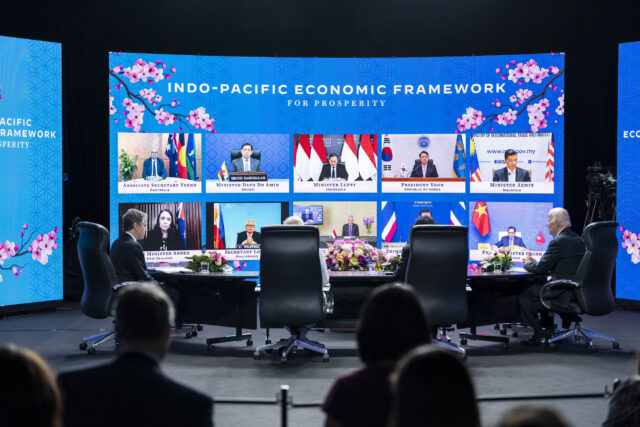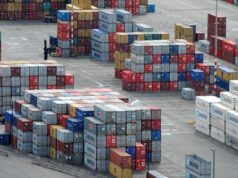
- US, 12 countries launch Indo-Pacific Economic Framework for Prosperity
- The 13 initial members of IPEF account for about 40% of the world’s gross domestic product
- The new group initially comprises the US, Japan, India, South Korea, Australia, Indonesia, Thailand, Singapore, Malaysia, the Philippines, Vietnam, New Zealand and Brunei
- Taiwan not included, but Biden said the US will defend the island militarily in case of a Chinese invasion
- IPEF seeks to deepen cooperation between the US and its Asian partners along four pillars – supply chain resiliency, clean energy and decarbonization, tax and anti-corruption, and trade
The United States and 12 countries launched the Indo-Pacific Economic Framework for Prosperity (IPEF) in Tokyo on May 23 as a highlight of President Joe Biden’s Asian visit to bolster America’s relations with the region.
The IPEF accounts for about 40% of the world’s gross domestic product. It consists initially of the US, Japan, India, South Korea, Australia, Indonesia, Thailand, Singapore, Malaysia, the Philippines, Vietnam, New Zealand and Brunei, the Biden administration said.
The group will focus on deepening cooperation between the US and its Asian partners along four pillars: supply chain resiliency, clean energy and decarbonization, tax and anti-corruption, and trade, the White House said. The last category includes issues the digital economy, emerging technology, labor rules, transparency and regulatory practices.
Excluded from the new group were Myanmar as well as Cambodia and Laos, the two China-friendly members of the Association of Southeast Asians Nations (ASEAN).
Taiwan was also left out of the group, apparently to avoid stoking US tensions with Beijing, which claims the Nationalist island-bastion as part of China and threatens to reunite it by force.
President Biden earlier met with Japanese Prime Minister Fumio Kishida to discuss trade and security issues that were made more urgent by geopolitical developments in Eastern Europe and security threats in Asia-Pacific.
In a joint news conference after the meeting at Akasaka Palace, Biden was asked if he would get involved militarily to defend Taiwan despite not doing so in Ukraine. He replied, “Yes. It’s a commitment we made.”
Biden said the US policy towards Taiwan is unchanged and that his administration adheres to the “One China policy” that acknowledges there is but one China.
“But the idea that (Taiwan) can be taken by force is just not appropriate. It will dislocate the entire region,” Biden said, adding that China has no “jurisdiction to go in and use force to take over Taiwan.”
All IPEF countries but India and the US are also members of the Regional Comprehensive Economic Partnership (RCEP) trade bloc that includes China and accounts for 30% of the world’s GDP.
Japan, Brunei, Malaysia, Singapore, Vietnam, Australia and New Zealand belong to the Comprehensive and Progressive Agreement for Trans-Pacific Partnership (CPTPP), which the US left in 2017 when it was still called the Trans-Pacific Partnership.
The US government hopes the IPEF will boost its economic presence in Asia, where China is flexing its economic and military might, in addition to projecting itself elsewhere in the world as new superpower.
An analysis by Tom Fowdy on the May 23 edition of the Beijing mouthpiece China Daily belittles Biden’s present focus on Southeast Asia as courting the countries in the region while keeping the view that the relationship “is a zero-sum game” in America’s favor.
On May 12, Biden hosted a summit with ASEAN leaders in Washington on May 12 to discuss bilateral relations.
The China Daily article, titled “US plan for anti-China alliance set for failure,” considers the US$150 million investment pledged by Washington to ASEAN states a paltry amount in comparison with the US$300 million assistance that a Chinese private company, Huawei, offered to Southeast Asian technology start-ups last year.
“While the US exerts pressure on Southeast Asian countries to take sides against China, and talks up its commitment to the region, in practice it continues to view the diplomatic relationships as a zero-sum game in its favor, a game that sees making concessions to other nations, in terms of business and trade, as unfavorable to US interests,” Fowdy said.
US Commerce Secretary Gina M. Raimondo and the White House, meanwhile, sought to reassure Americans about the benefits from IPEF in a statement she issued after the launch.
The new group “is a clear demonstration of the Biden administration’s commitment to pursuing economic engagement that benefits American workers, families, and businesses,”she said.
“This framework will enable the United States to expand its economic leadership in the Indo-Pacific and work with our allies and partners in the region to secure our supply chains, increase clean energy production, and cooperate on the development and regulation of emerging technologies,” said Raimondo, who joined Biden on his Asia-Pacific swing.
“Nearly one billion people in the Indo-Pacific will enter the middle class over the next decade. Deepening our ties to the region is good for American workers and businesses and that of our partners in the region, and it is crucial to our ability to stay competitive.”
The White House said in a briefing on Monday that the US foreign direct investment in the region totalled more than US$969 billion in 2020 and has nearly doubled in the last decade, “and we are the leading exporter of services to the region, helping fuel regional growth.
“Trade with the Indo-Pacific supports more than 3 million American jobs and is the source of nearly US$900 billion in foreign direct investment in the United States,” the White House said.
Raimondo told reporters in an online briefing on Monday that the group’s launch marks “an important turning point in restoring US economic leadership in the region, and presenting Indo-Pacific countries an alternative to China’s approach to … critical issues”.
Raimondo said IPEF was designed as a more innovative and flexible approach, as such issues as supply chain resiliency and environmental protection have become more vital for many economies.
“The most pressing issues that we need to tackle with our allies have changed. We need a new approach, going forward, if we’re going to meet the needs of our citizens. So by focusing on economic priorities that affect all of our economies, this framework is designed to reflect the shared realities we face,” Raimondo said.
The 13 IPEF participants were expected to start negotiations on each of the four pillars of the group, said Raimondo. “There will be firm commitments, there will be signed agreements, and like any agreement, we plan to have high standards, a commitment that will be enforceable.”
Taiwan was not included as a founding member, despite the island being a key node for the global semiconductor supply chain. Taiwanese authorities reportedly sought membership in the IPEF.
“The Ministry of Foreign Affairs regrets that our country was not included in the first-round list of IPEF,” an official statement from Taiwan said Sunday, the Japanese newspaper Nikkei reported.
So far, Taipei has not commented on Biden’s remarks over US military involvement should China invade Taiwan.








